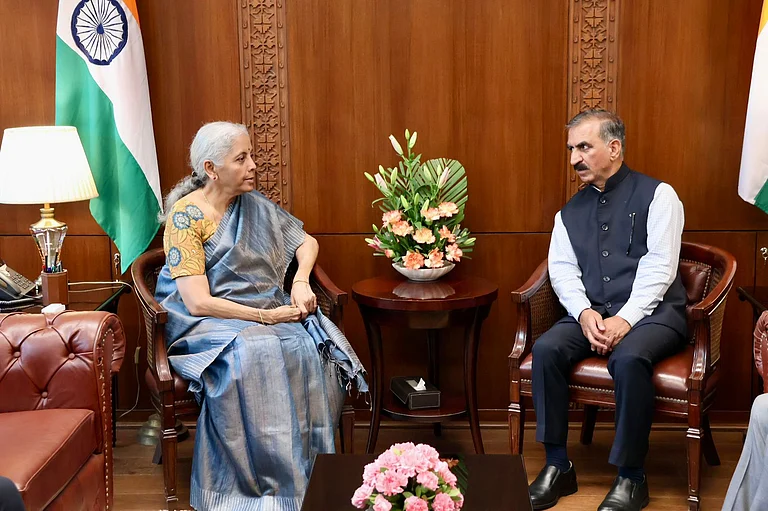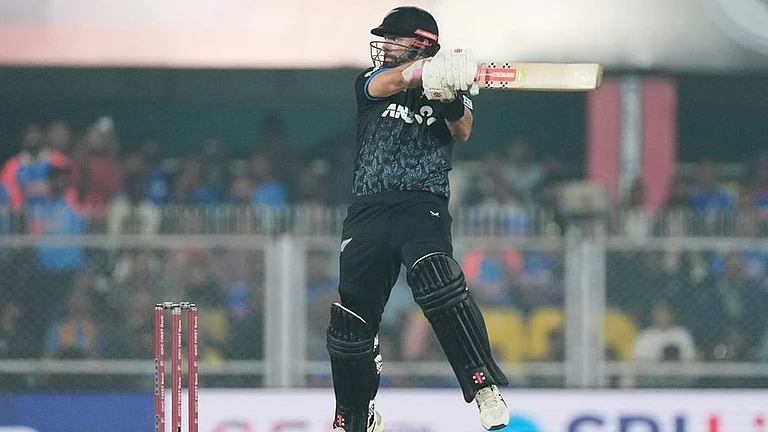Saving Chim Chim
One of the most touching stories of the year unfolded on a Mumbai street, when four autorickshaw drivers sacrificed a day’s work to save an electrocuted monkey that one of them had befriended. The monkey—its canines removed and solitary, probably a captive castaway as its wild kind are naturally inclined to live in packs—had made a tree leaning over an autorickshaw stand its home. Autowallah Dilip Rajbhar, 23, often fed him fruits, forging a friendship with the arboreal animal. It vanished one day but returned later with burns and in great pain. Rajbhar and his colleagues— Shiraz, Mahesh and Sabhajeet—caught the monkey, covered it with a gunny sack, and set off for the nearest veterinarian’s clinic some 14km away. The monkey will survive, the four heroes ensured. They don’t wear capes and aren’t with any fancy save-animal groups either.

Rafale Wedding
Now RSVP this—a wedding invitation loaded not with mush but a muscular political monologue in the nation’s interest, which attracts the Prime Minister’s attention and praise. People seldom spill their political spiel on wedding cards but Yuvraj Pokharna of Surat couldn’t resist writing a whole page to justify the Modi government’s contract to buy Rafale fighter jets. Pokharna states ‘Some facts about Rafale deal’ as he writes: “Even a fool will not compare prices of a simple fly-away aircraft with a weaponised jet.” This BJP supporter signs off by urging his guests to vote for the party this summer. The PM congratulates and reciprocates: “The ingenuity of its content reflects your abiding concern and love for the nation.” Oh how we thought social media is the only platform where personal opinions are pandered about!

Poll Model
Lottery winners seldom become youth icons but when you are Bihar’s Sushil Kumar, the Rs 6,000-a-month computer operator for MNEREGA who goes on to scoop the Rs 5-crore jackpot on Amitabh Bachchan-anchored reality TV golden goose Kaun Banega Crorepati (KBC), you become a role model, an inspiration. And who won’t with tax-adjusted Rs3.6 crore in the pocket? Well, the 35-year-old, now a schoolteacher, is the state election commission’s choice for brand ambassador to inspire people to vote in the general elections this summer. That’s cashing in on East Champaran’s most popular man. Hope Kumar does not blow it like he apparently did with the winnings—binge-spending on a house, farmland, and an ever-growing extended family.

Pak’s Mane Export
For all the money, weapons and provisions that best friend China sends to Pakistan, what does it get in return? Well, over 100,000 kg of human hair over five years. The Pakistani commerce and textiles ministry said so in parliament. The Pakistani hair feeds the Chinese beauty industry which depends heavily on imports, though one may ask why the world’s most populated nation can’t source the material locally. Are the Chinese caught in an epidemic follicular regression? Negative; the answer may be un-PC but experts rule Chinese hair inferior to the subcontinental dark, dense crop. The best is the Indian silky hair—a reason not to miss ma’s hot oil massage. The second-best, debatable, is the ‘raw Burmese hair’ from Myanmar, which earned US$ 6.2 million in 2017 exporting hair equivalent to the weight of 1,160 cars. The business has spawned ponytail bandits ‘snipping’ at the unsuspecting in pagoda land.

Fatal Selfie
Caution: Don’t approach wildlife…they may look friendly but can cause serious injury or death. Such warnings blur into insignificance when it comes to the signs of our times—the perfect selfie with a wild tusker, for instance. Results are dangerous; fatal in the case of a 50-year-old tourist from Bangladesh visiting the Gorumara National Park in northern Bengal where he got a bit too close to a bull elephant for a close-up shot, which became his last as the animal caught him with its trunk and trampled him to death. Heed our advice, please —keep the wildlife at a distance.
Who Let The Worms Out?
A shape-shifting monkey warrior from the mainland burnt the island down. So they say. The next import from India to cause unprecedented devastation in Sri Lanka is a creepy-crawly with an insatiable appetite—the larvae of the fall armyworm moth that piggybacked strong winds across the Palk Strait. No stone bridge needed. The pest has already plagued farmers in India, before drought-hit Lankan maize farmers discovered the bug ‘sena’ in their fields. Lankan parliament is debating if pesticides can be sprayed. One may need a worm’s eye view for a decision.
Milking A Fad
There are stars that glow in the Milky Way and then there are ‘superstars’ in Tamil Nadu who promote their cinema in a milky way—the fans dousing posters and cutouts of new releases with moo juice. A milk bath is as ancient as the Egyptians, like a tub of donkey’s milk nursing Cleopatra’s skin, or old Hindu rituals such as paal abhishekam that encourages the faithful—in this case actor Simbu’s admirers—to dunk images and statues of deities with milk. No big deal in this movie-mad land. But to prove their loyalty, Simbu fans apparently stole milk packets, prompting dairy dealers to report police. What is Simbu’s take to stop the thievery? Pour milk generously from jars, instead of packets, he said.

Image And The Moolah
For many outsiders, Pakistan is a country ridden with terrorists and a place too dangerous to visit. But the Imran Khan government is keen to change that image and dispel much of the misgivings foreigners have about the nation. The Pakistani government has already taken steps to liberalise its visa policy to give tourism a boost.
In a diplomatic overdrive it has begun to implore foreign envoys to convince their governments to change the opinion about Pakistan. Foreign minister Shah Mahmood Qureshi asked diplomats on Monday to play their part in persuading their headquarters to revisit their “travel advisory” about Pakistan. Addressing a function in Islamabad that was attended by foreign diplomats, Qureshi apprised them as to how counter-terrorism operations had facilitated the return of normality in Swat, a district in Pakistan’s Khyber-Pakhtunkhwa province known for its scenic beauty but also for its terrorist violence.
According to Qureshi, his country played its part by liberalising its visa regime. “You’ll have to do your bit,” he said. “And your bit is about the travel advisories.”
Travel advisories of various nations ask their citizens to stay away from Pakistan. If it necessary to visit Pakistan for work or business, the advisories say, foreigners should be cautious when they step out of their hotels and while travelling in the country. Pakistani wants the diplomats to urgently take steps to convince their governments to change their views about the country and encourage tourists.
Qureshi reminded them that their job was to “build relations” between their government and the host country. “And relations can only be built if they are people-centric. You can play a significant role in turning around relations,” he said.
On January 25, information minister Fawad Chaudhry said the government was introducing a “new revolutionary visa policy.” He announced that the government had decided to provide e-visa facility to 175 countries and visa on arrival to 50 countries, including Indians of British and US origin.
But tourists from India, like their counterparts in Pakistan, will still have to apply for and get the visa from each other’s high commissions. After all, reciprocity in Indo-Pakistan relations still trumps all liberal ideas.
Illustrations by Manjul; Text by Alka Gupta & Probir Pramanik


























